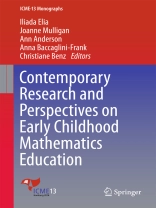This book brings together a collection of research-based papers on current issues in early childhood mathematics education that were presented in the Topic Study Group 1 (TSG 1) at the 13th International Congress on Mathematical Education (ICME-13), held at the University of Hamburg in 2016. It will help readers understand a range of key issues that early childhood mathematics educators encounter today.
Research on early childhood mathematics education has grown in recent years, due in part to the well-documented, positive relation between children’s early mathematical knowledge and their later mathematics learning, and to the considerable emphasis many countries are now placing on preschool education.
The book addresses a number of central questions, including: What is mathematical structural development and how can we promote it in early childhood? How can multimodality and embodiment contribute to early mathematics learning and to acquiring a better understanding of young children’s mathematical development? How can children’s informal mathematics-related experiences affect instruction and children’s learning in different mathematics content areas? What is the role of tools, including technology and picture books, in supporting early mathematics learning? What are the challenges in early childhood mathematics education for teachers’ education and professional development?
表中的内容
Introduction.- 1. Research in early childhood mathematics education today.- 2. Promoting early mathematical structural development through an integrated assessment and pedagogical program.- 3. Repeating patterning competencies in 3- and 4-year old Kindergartners.- 4. Τhe influence of fostering children’s pattern and structure abilities on their arithmetic skills in Grade 1.- 5. Ecuadorian Kindergartners´ SFON development: Contribution of Early Numerical Abilities and Quality of Mathematics Education.- 6. Kindergartners’ Spontaneous focus on number during picture book reading.- 7. Measurement makes numbers sensible.- 8. Figuring Space: Circling three children’s geometric reasonings and sense.- 9. Observing the use of gestures in young children’s geometry thinking.- 10. Math-In-Context: A study of the types of math preschoolers ‘do’ at home.- 11. Time, immersion and articulation: Digital technology for early childhood mathematics.- 12. What schemes do preschoolers develop when using multi-touch applications to foster number sense (and why)?.- 13. Interactive mathematics storybooks and their friends.- 14.- Early childhood teachers’ knowledge and self-efficacy for evaluating solutions to repeating patterns tasks.- 15. Influences on early childhood educators’ mathematics-related competencies, curricula and professional learning.- 16.- Early childhood mathematics education: Conclusions and moving forward.












